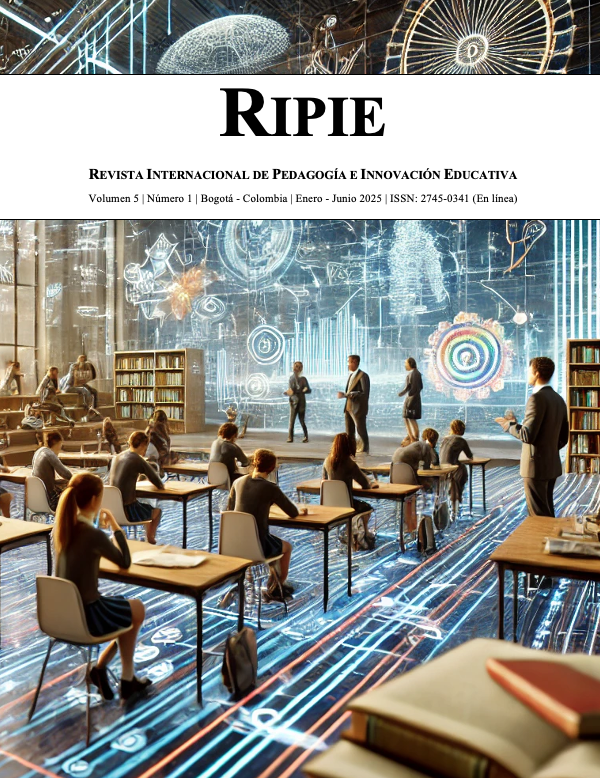Innovación pedagógica en la enseñanza de la Inteligencia Artificial
DOI:
https://doi.org/10.51660/ripie51226Palabras clave:
innovación pedagógica, inteligencia artificial, enseñanza, aprendizaje, estrategias pedagógicas, enfoques pedagógicosResumen
La innovación pedagógica en la enseñanza de la inteligencia artificial (IA) busca abordar los desafíos y oportunidades de la era digital en la educación. El contexto incluye la rápida evolución de la IA y su impacto en la sociedad, lo que requiere una preparación adecuada de los estudiantes. La pregunta investigada es cómo las estrategias pedagógicas innovadoras pueden mejorar la comprensión y aplicación de la IA. El objetivo es analizar estas interrelaciones y destacar cómo un enfoque educativo adaptativo puede beneficiar a los estudiantes. Los principales hallazgos muestran que métodos como el aprendizaje basado en proyectos y el uso de tecnologías de IA mejoran la comprensión y habilidades prácticas. Además, integrar consideraciones éticas y sociales en el currículo es fundamental. En conclusión, la innovación pedagógica promueve una educación más completa y ética, preparando a los estudiantes para enfrentar los desafíos de la IA en la sociedad actual.
Descargas
Referencias
Amershi, S., Weld, D., Vorvoreanu, M., Fourney, A., Nushi, B., Collisson, P., ... & Horvitz, E. (2019). Guidelines for human-AI interaction. In Proceedings of the 2019 CHI Conference on Human Factors in Computing Systems (pp. 1-13). https://doi.org/10.1145/3290605.3300233
Biggs, J., & Tang, C. (2011). Teaching for quality learning at university (4th ed.). Open University Press. https://doi.org/10.1017/CBO9781139169297
Binns, R. (2018). Fairness in machine learning: Lessons from political philosophy. Proceedings of the 2018 Conference on Fairness, Accountability, and Transparency, 149-159. https://doi.org/10.1145/3287560.3287586
Black, P., & Wiliam, D. (1998). Assessment and classroom learning. Assessment in Education: Principles, Policy & Practice, 5(1), 7-74. https://doi.org/10.1080/0969595980050102
Bozkurt, A., Xiao, J., Lambert, S., Pazurek, A., Crompton, H., Koseoglu, S., Farrow, R., Bond, M., Nerantzi, C., Honeychurch, S., Bali, M., Dron, J., Mir, K., Stewart, B., Costello, E., Mason, J., Stracke, C. M., Romero-Hall, E., Koutropoulos, A., … Jandrić, P. (2023). Speculative futures on ChatGPT and generative artificial intelligence (AI): A collective reflection from the educational landscape. Asian Journal of Distance Education, 18(1), 53-130. https://doi.org/10.5281/zenodo.7636568
Dastin, J. (2018). Amazon scraps secret AI recruiting tool that showed bias against women. Reuters.
D'Mello, S. K., & Graesser, A. C. (2012). AutoTutor and Affective AutoTutor: Learning by talking with cognitively and emotionally intelligent computers that talk back. ACM Transactions on Interactive Intelligent Systems (TiiS), 2(4), 1-39. https://doi.org/10.1145/2395123.2395128
Eubanks, V. (2018). Automating inequality: How high-tech tools profile, police, and punish the poor. St. Martin's Press. https://doi.org/10.1177/0095399717753360
Falmagne, J.-C., Albert, D., Doble, C., Eppstein, D., & Hu, X. (2013). Knowledge spaces: Applications in education. Springer. https://doi.org/10.1007/978-3-642-35329-5
Flores-Vivar, J. M., & García-Peñalvo, F. J. (2023). Reflections on the ethics, potential, and challenges of artificial intelligence in the framework of quality education (SDG4). Comunicar, 31(74), 35-44. https://doi.org/10.3916/C74-2023-03
Fullan, M. (2016). The new meaning of educational change (5th ed.). Teachers College Press.
Fullan, M., & Langworthy, M. (2014). A rich seam: How new pedagogies find deep learning. Pearson.
García-Peñalvo, F. J., Llorens-Largo, F., & Vidal, J. (2024). La nueva realidad de la educación ante los avances de la inteligencia artificial generativa. RIED-Revista Iberoamericana de Educación a Distancia, 27(1), 9-39.
Goodfellow, I., Bengio, Y., & Courville, A. (2016). Deep learning. MIT Press.
Hao, K. (2019). We need to solve AI's 'data crisis'—and look to neuroscience for answers. MIT Technology Review.
Harvard University. (2021). AI for social good.
Hattie, J. (2008). Visible learning: A synthesis of over 800 meta-analyses relating to achievement. Routledge. https://doi.org/10.4324/9780203887332
Hmelo-Silver, C. E., Duncan, R. G., & Chinn, C. A. (2013). Scaffolding and achievement in problem-based and inquiry learning: A response to Kirschner, Sweller, and Clark (2006). Educational Psychologist, 42(2), 99-107. https://doi.org/10.1080/00461520701263368
Luckin, R., Holmes, W., Griffiths, M., & Forcier, L. B. (2016). Intelligence unleashed: An argument for AI in education. Pearson.
Martínez Cardero, D. (2024). Fomento de la creatividad en programas de enseñanza de inteligencia artificial: análisis de 55 universidades. Artículo inédito. Universidad de las Ciencias Informáticas, Habana, Cuba.
MIT. (2019). AI, ethics, and society.
Mittelstadt, B. D., Allo, P., Taddeo, M., Wachter, S., & Floridi, L. (2016). The ethics of algorithms: Mapping the debate. Big Data & Society, 3(2), 1-21. https://doi.org/10.1177/2053951716679679
Nania, J., Bonilla, S., Woodbury, A., & Charrington, M. (2022). The state of AI education for K-12. Harvard Data Science Review, 4(3). https://doi.org/10.1162/99608f92.a8c5bed0
Navarro, M., Losada, D., & Gaviria, D. (2021). Innovación pedagógica y aprendizaje experiencial: Una mirada hacia la transformación del aprendizaje. Revista de Investigación en Pedagogía, 3, 27-40.
Ng, D. T. K., Lee, M., Tan, R. J. Y., Hu, X., Downie, J. S., & Chu, S. K. W. (2022). A review of AI teaching and learning from 2000 to 2020. Education and Information Technologies, In Press. https://doi.org/10.1007/s10639-022-11491-w
Perrault, R., Shoham, Y., Brynjolfsson, E., Clark, J., Etzioni, O., Grosz, B., ... & Manyika, J. (2019). The AI index 2019 annual report. AI Index Steering Committee, Human-Centered AI Institute, Stanford University.
Russell, S., & Norvig, P. (2020). Artificial intelligence: A modern approach (4th ed.). Pearson.
UNESCO. (2019). Artificial intelligence in education: Challenges and opportunities for sustainable development.
West, D. M. (2019). The role of AI in education: Current progress and future challenges. Brookings Institution. https://www.brookings.edu/research/the-role-of-ai-in-education-current-progress-and-future-challenges/
Woolf, B. P. (2021). Building intelligent interactive tutors: Student-centered strategies for revolutionizing e-learning. Morgan Kaufmann.
Descargas
Publicado
Número
Sección
Licencia
Derechos de autor 2025 Revista Internacional de Pedagogía e Innovación Educativa

Esta obra está bajo una licencia internacional Creative Commons Atribución-NoComercial-CompartirIgual 4.0.
Los artículos se publican bajo los términos de una licencia que permite el uso, distribución y reproducción en cualquier medio, siempre que el trabajo original se cite correctamente. Ed&TIC conserva los derechos patrimoniales de las obras publicadas y promueve activamente la reutilización de las mismas bajo los términos de la licencia mencionada anteriormente, lo que fomenta la difusión del conocimiento y la colaboración en la comunidad académica.


